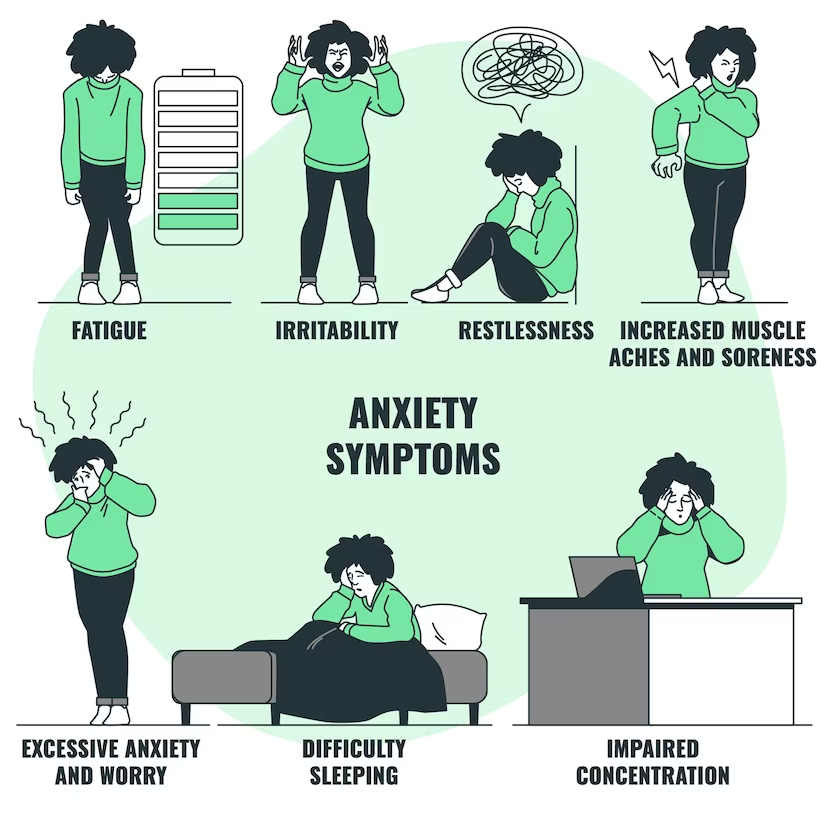Anxiety disorders are prevalent mental health conditions that affect many individuals in South Africa. These disorders can cause significant distress and impact various aspects of daily life, including sleep. Sleep disturbances, such as insomnia or restless sleep, are common among individuals with anxiety disorders and can further exacerbate their symptoms. Understanding the relationship between anxiety and sleep and implementing strategies to address sleep disturbances are essential for promoting better sleep and overall well-being among individuals in South Africa.
- Recognizing the Anxiety-Sleep Connection: Anxiety and sleep have a bidirectional relationship. Anxiety can disrupt sleep, and sleep disturbances can worsen anxiety symptoms. Anxiety disorders often involve persistent worry, racing thoughts, and hyperarousal, which can make it challenging to fall asleep or stay asleep. On the other hand, lack of sufficient sleep can contribute to increased anxiety levels, creating a cycle of sleeplessness and anxiety.
- Establishing a Calming Bedtime Routine: Creating a relaxing routine before bed can help calm the mind and prepare the body for sleep. Engage in activities such as reading a book, taking a warm bath, practicing relaxation techniques (deep breathing, progressive muscle relaxation), or listening to soothing music. Consistency is key, as establishing a regular bedtime routine can signal to the brain that it’s time to wind down and promote better sleep quality.
- Creating a Sleep-Conducive Environment: Designing a sleep-friendly environment is crucial for individuals with anxiety disorders. Ensure the bedroom is dark, quiet, and comfortable. Use blackout curtains, earplugs, or white noise machines to minimize external disruptions. Keep electronic devices out of the bedroom to avoid exposure to stimulating content that can interfere with sleep.
- Implementing Relaxation Techniques: Practicing relaxation techniques can help individuals with anxiety disorders manage their symptoms and improve sleep quality. Techniques such as deep breathing exercises, meditation, mindfulness, or yoga can promote relaxation, reduce anxiety levels, and facilitate better sleep. Consider incorporating these practices into your daily routine, particularly before bed.
- Cognitive-Behavioral Therapy (CBT): CBT is a widely recognized therapeutic approach for anxiety disorders and can also be effective in addressing sleep disturbances. CBT helps individuals identify and challenge negative thought patterns, develop coping strategies, and modify behaviors that contribute to sleep difficulties. Seeking guidance from a qualified mental health professional trained in CBT can be beneficial for managing anxiety-related sleep disturbances.
- Regular Exercise: Engaging in regular physical activity is known to improve both mental health and sleep quality. Exercise can help reduce anxiety symptoms, release endorphins (feel-good hormones), and promote better sleep. Aim for at least 30 minutes of moderate-intensity exercise most days of the week, but avoid exercising too close to bedtime as it may increase alertness and make it harder to fall asleep.
- Mindfulness and Stress Management: Incorporating mindfulness practices and stress management techniques into daily life can significantly benefit individuals with anxiety disorders and sleep disturbances. Mindfulness involves focusing on the present moment without judgment, allowing individuals to cultivate a sense of calm and reduce anxiety. Techniques such as journaling, practicing gratitude, or seeking social support can also aid in stress reduction and improve sleep.
- Consult a Healthcare Professional: If sleep disturbances persist and significantly impact daily functioning, it is important to seek professional help. Mental health professionals can provide a comprehensive assessment, diagnose anxiety disorders, and recommend appropriate treatments. In some cases, medication or a combination of therapy and medication may be necessary to manage anxiety and improve sleep quality.
Addressing sleep disturbances in South African individuals with anxiety disorders requires a holistic approach that focuses on both anxiety management and sleep hygiene practices. By implementing strategies such as establishing a calming bedtime routine, creating a sleep-conducive environment, practicing relaxation techniques, considering therapy options like CBT, engaging in regular exercise, and seeking professional guidance when needed, individuals can alleviate sleep disturbances and enhance their overall well-being. Taking steps to prioritize sleep can contribute to better anxiety management and an improved quality of life.










